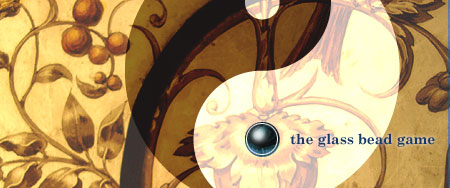The Glass Bead Game
or, Magister Ludi
by Hermann Hesse
I decided to read this book on BN’s recommendation. We own it, and he read it while an undergrad. He’d warned me that it was not exactly a thriller. So I tackled it as a learning experience and a challenge. While I was reading the initial section (a sort of introduction) I decided to take notes and look up all the unfamiliar words, as well as all the concepts and people that I have heard of but can’t really say what they are about. It turned out to be quite a lot of research – Wikipedia rocks!
So, the book. It’s a fictional biography of a man named Joseph Knecht who lives some time in the future. The world has been through another sort of Dark Age, and a special Order of intellectuals has been formed to protect the culture and discipline of the Mind, which (as we know) would otherwise be lost in the daily grind of business, politics, and practicality. The story tells of Knecht’s life: his education within the Castalian structure, and the formative relationships he has with the Masters, his colleagues, and contacts with the outside world. We watch his gradual rise to one of the top positions in the heirarchy, the master of the Glass Bead Game. There’s a bit of a twist in the plot at the end, and some of Knecht’s writings are appended as supplements to the narrative.

I enjoyed reading about Joseph’s world, this un-religion of esoteric knowledge, eastern-style mysticism, classical music, and of course the enigmatic Game which is supposed to bring every discipline into a harmonious dance or work of performance art. Hesse mostly leaves this up to the imagination, which I suppose was the right idea but I would have liked to know more about the details like the special visual language of symbols and notation they used to orchestrate the Game.
I didn’t find Joseph to be a very sympathetic character. He had a charmed life, loved everybody, and everybody loved him. The only real conflict in his life comes at the climax of the book and even then he handles it perfectly, says all the right things, feels fine, and nobody hates him.
One aspect of the book that sort of bothered me was the way Hesse handled the whole “biography” construct. Sometimes the narrators (they always refer to themselves as “we”) took great pains to explain where they had obtained a certain anecdote, and then other times you’d read along for entire chapters with none of that contrivance. Especially jarring is at the end of the book, when the “biographers” leave off their part and publish a “legend” written by students in the Order. All well and good, except the tone and style are practically identical for the two parts. I got the impression that as Hesse was writing he sometimes got so absorbed that he forgot it was supposed to be a biography.
I guess where I felt this book was lacking was that I didn’t have any emotional involvement with it. I was intrigued by the concepts, and I sure learned a lot of new words and facts about ancient philosophers, Baroque composers, and such. But I didn’t learn anything about myself or what it means to be human. Maybe that would have mattered less if it had been a real biography of a person who actually lived.
One of the most enjoyable parts of the book was at the very end, with the 3 short stories supposedly written by Knecht during his later education. The assignment was to write yourself a different “life” as a character in a different time and culture. These were great. The first one, where Knecht is a shaman “Rainmaker” in a stone-age culture, is the most exciting. The second one, with Josephus the Catholic hermit, was my favorite. It was intriguing and clever, and more spiritually and emotionally meaningful than the main novel! The third one, the Indian life, was pretty disturbing but convincingly Hindu in flavor.
In summary, I’m glad I read this book. It’s really different from most books I’ve read and it is very interesting, though not at all gripping. I think the only friend or family member I’d recommend it to would be BN, and he’s already read it.

Leave a Reply